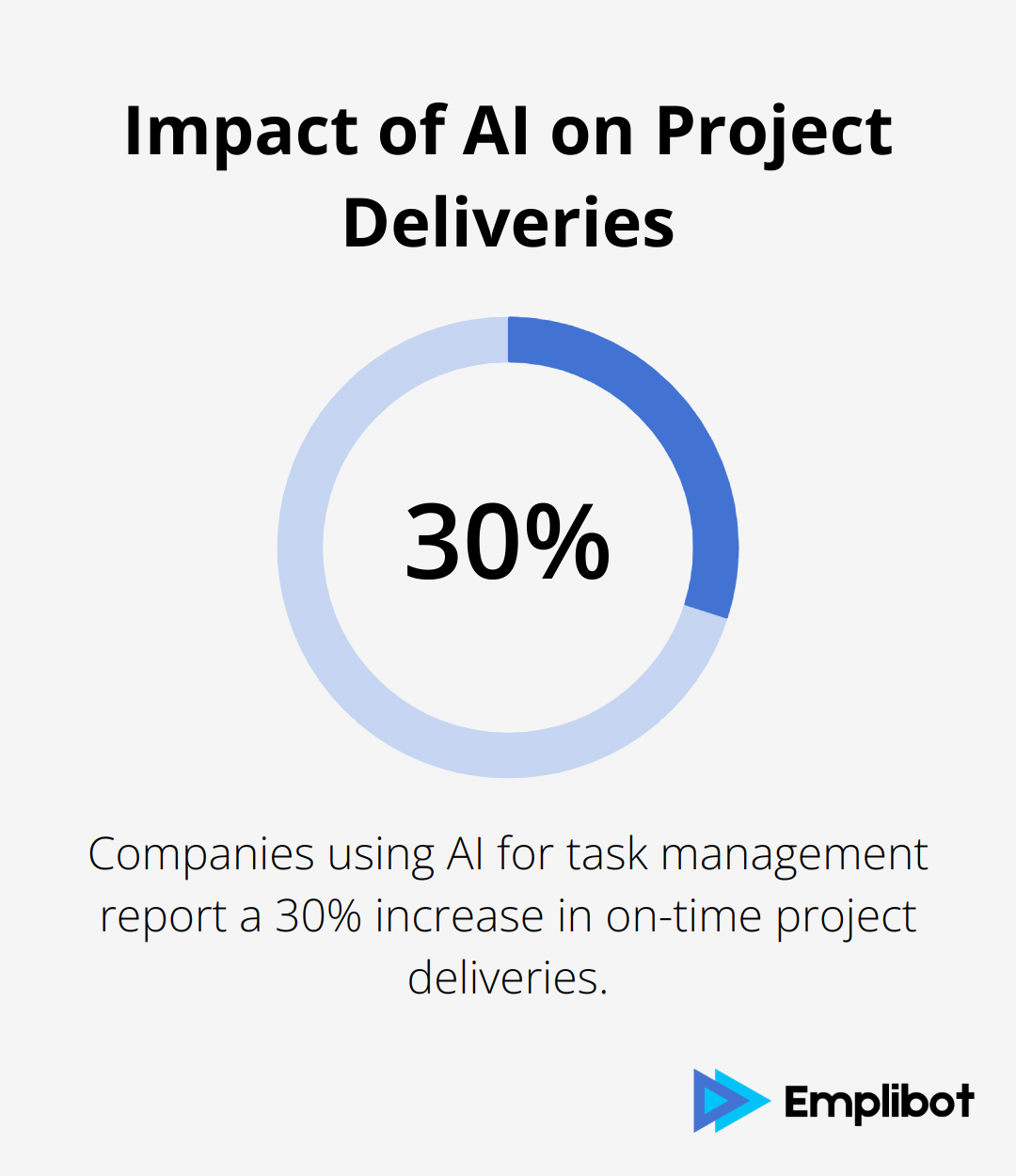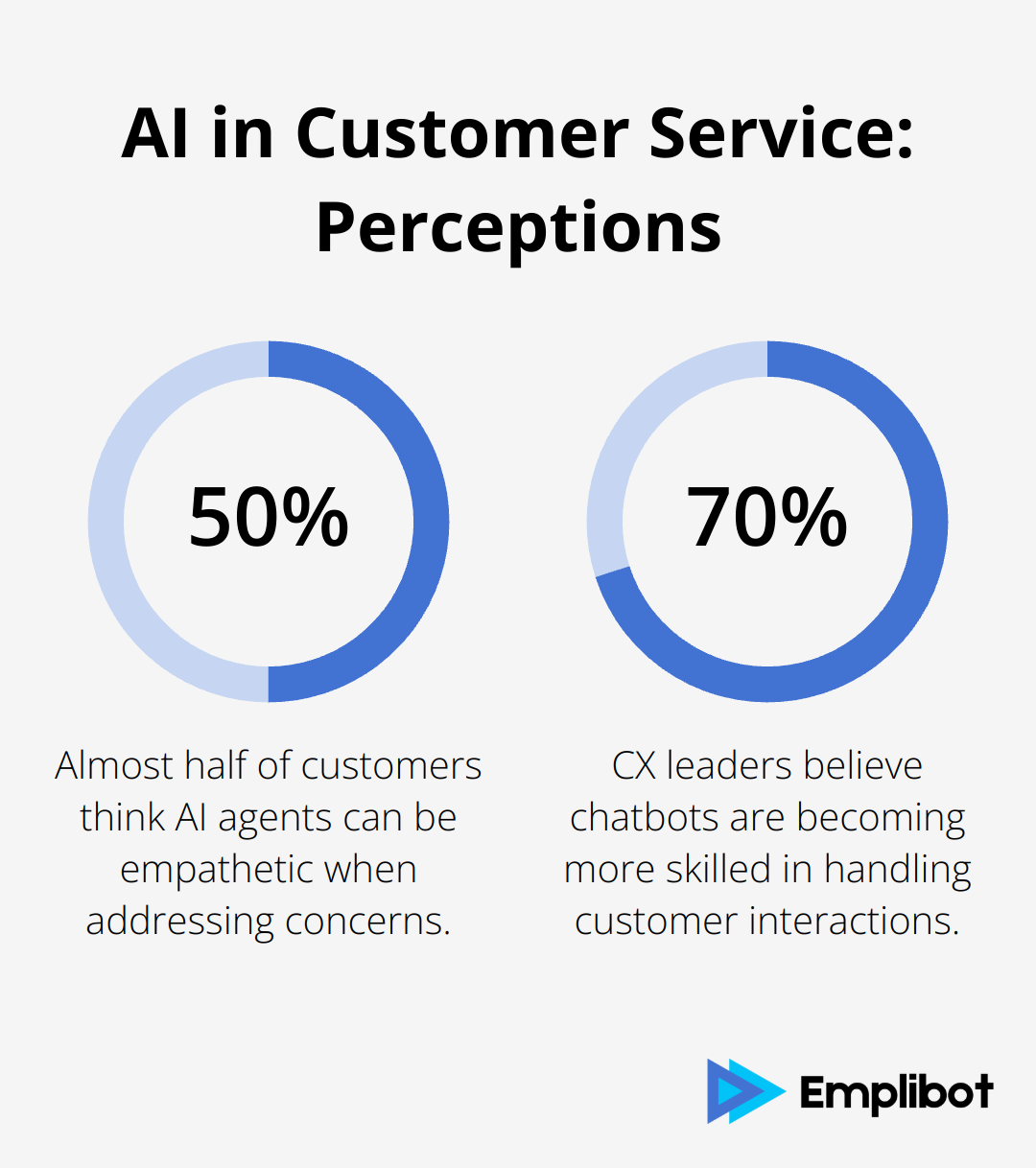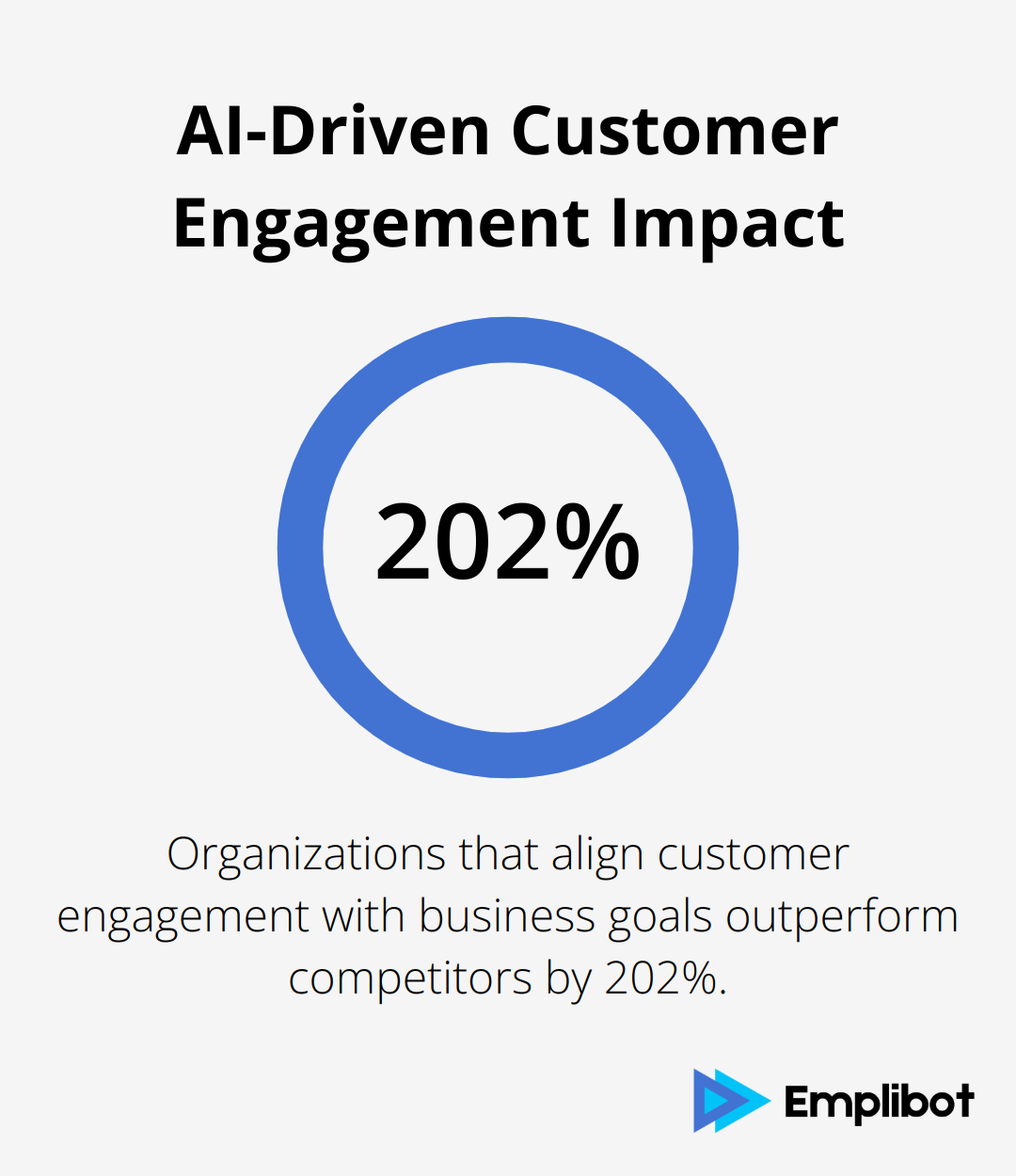AI business tools are revolutionizing how companies operate, boosting efficiency and driving growth across industries. From streamlining project management to enhancing customer service and supercharging marketing efforts, these innovative solutions are transforming business landscapes.
At Emplibot, we’ve witnessed firsthand the impact of AI-powered tools on organizational success. In this post, we’ll explore the top AI business tools that can give your company a competitive edge in today’s fast-paced market.
How AI Transforms Project Management
AI-powered tools have revolutionized project management, reshaping team collaboration, planning, and execution. These innovative solutions lead to improved efficiency and better outcomes across organizations.
Streamlined Task Management
AI-driven project management tools excel at automating task assignment and scheduling. Asana’s AI features can design AI-powered workflows to handle routine tasks without requiring code. This allows teams to focus on higher-impact work while AI takes care of the routine tasks.
Companies that use AI for task management report a 30% increase in on-time project deliveries. These tools consider factors like team member skills, availability, and past performance to make intelligent assignments, which reduces the risk of bottlenecks and missed deadlines.

Data-Driven Decision Making
Predictive analytics is another game-changing feature of AI project management tools. These systems analyze historical project data to forecast potential risks, estimate completion times, and predict resource needs with remarkable accuracy.
Microsoft’s AI capabilities can enable predictive analytics through Azure AI and machine learning. This predictive power enables businesses to make data-driven decisions, allocate resources more effectively, and improve overall project success rates.
Enhanced Team Collaboration
AI-powered real-time collaboration features have revolutionized how teams work together. Tools like Slack incorporate AI to facilitate smoother communication by suggesting relevant channels, highlighting important messages, and even summarizing long threads.
A Deloitte survey found that companies using AI-enhanced collaboration tools saw a 25% increase in team productivity. These platforms create a more connected work environment, break down silos, and foster innovation.
AI-Powered Resource Allocation
AI algorithms optimize resource allocation by analyzing project requirements, team member skills, and availability. This intelligent allocation ensures that the right people work on the right tasks at the right time, maximizing productivity and minimizing waste.
For example, Resource Guru uses AI to automatically schedule resources based on skills, availability, and project priorities. This smart allocation can lead to a 20% increase in resource utilization (as reported by their case studies).
Automated Reporting and Analytics
AI-driven project management tools automate the creation of detailed reports and provide real-time analytics. These features give project managers and stakeholders instant insights into project progress, potential bottlenecks, and areas for improvement.
Tools like Forecast.app use AI to generate automated reports that highlight key project metrics, risks, and trends. This automation saves time and provides more accurate, data-driven insights for decision-making.
As we move forward, let’s explore how AI is not only transforming project management but also revolutionizing customer service solutions, providing businesses with powerful tools to enhance customer experiences and drive satisfaction.
How AI Transforms Customer Service
AI-enhanced customer service solutions reshape how businesses interact with their customers. These tools provide round-the-clock support, analyze customer sentiment, and deliver personalized experiences at scale.
24/7 Support with AI Chatbots
AI-powered chatbots have become indispensable for businesses that provide continuous customer support. These intelligent systems handle a wide range of customer inquiries, from basic FAQs to complex troubleshooting, without human intervention. Almost one-half of customers think AI agents can be empathetic when addressing concerns, and 70% of CX leaders believe chatbots are becoming more skilled.

A study by Juniper Research expects chatbots to save businesses $8 billion annually by 2025. This significant cost reduction pairs with improved response times and customer satisfaction. HubSpot’s chatbot reduced their average first response time by 16 minutes (a substantial improvement in customer service efficiency).
Decoding Customer Emotions
Sentiment analysis tools use natural language processing to gauge customer emotions from text-based interactions. This technology allows businesses to understand customer feelings in real-time, enabling more empathetic and effective responses.
Gartner predicts that by 2026, 75% of customers who call customer service and support organizations will do so out of loneliness, not because they have a customer service issue. Tools like IBM Watson analyze customer sentiment across various channels, helping businesses tailor their responses and improve overall customer satisfaction.
Personalization at Scale
AI algorithms excel at analyzing vast amounts of customer data to create personalized experiences. These systems predict customer preferences, recommend products, and tailor communication based on individual customer profiles.
Amazon’s recommendation engine, powered by AI, accounts for 35% of the company’s revenue. This showcases the power of AI-driven personalization in enhancing customer experience and driving business growth.
Proactive Customer Service
AI enables businesses to anticipate customer needs and address issues before they escalate. Predictive analytics identify patterns in customer behavior and product usage, allowing companies to proactively reach out with solutions or offers.
For example, Netflix uses AI to predict when a user might cancel their subscription and takes preemptive action to retain them. This proactive approach can significantly reduce churn rates and improve customer loyalty.
Multilingual Support
AI-powered translation tools break down language barriers in customer service. These systems provide real-time translation, allowing businesses to serve a global customer base without the need for multilingual support staff.
Google’s AI translation technology supports over 100 languages, enabling businesses to communicate effectively with customers worldwide. This capability expands market reach and enhances customer satisfaction across diverse linguistic backgrounds.
As AI continues to revolutionize customer service, it also transforms other critical business functions. The next section explores how AI-driven marketing and sales platforms provide businesses with powerful tools to drive growth and efficiency.
How AI Revolutionizes Marketing and Sales
AI-driven marketing and sales platforms transform how businesses attract, engage, and convert customers. These tools offer unprecedented capabilities in content creation, lead qualification, and pricing strategies, enabling companies to achieve remarkable results.
AI-Powered Content Generation
AI content generation tools have become indispensable for marketing teams. These platforms produce high-quality blog posts, social media content, and ad copy in minutes. A study by Accenture reveals that 84% of marketing executives believe AI will revolutionize their field by enhancing creativity and productivity.
Emplibot automates the entire content creation process, from keyword research to content generation and SEO optimization. This approach saves businesses countless hours and ensures a consistent flow of engaging, relevant content.
Predictive Lead Scoring
AI algorithms excel at identifying high-potential leads. These systems analyze vast amounts of customer data to predict which leads are most likely to convert. Organizations that align customer engagement with business goals outperform competitors by 202%, according to the Aberdeen Group.

AI-powered systems consider factors like past purchasing behavior, engagement with marketing materials, and demographic information to assign accurate lead scores. This enables sales teams to focus their efforts on the most promising prospects, significantly improving conversion rates and sales efficiency.
Dynamic Pricing Optimization
AI revolutionizes pricing strategies by enabling real-time, data-driven decisions. Some e-commerce giants update prices every 10 minutes based on competitor pricing, inventory levels, and demand.
Machine learning algorithms analyze market conditions, competitor prices, and customer behavior to determine optimal pricing strategies. This approach can increase profit margins by up to 25%, according to a study by McKinsey & Company.
Personalized Customer Experiences
AI-driven marketing platforms create highly personalized customer experiences. These tools analyze user behavior, preferences, and purchase history to deliver tailored content, product recommendations, and offers. A study by Epsilon found that 80% of consumers are more likely to make a purchase when brands offer personalized experiences.
Automated Ad Optimization
AI optimizes advertising campaigns in real-time, adjusting bids, targeting, and ad creative based on performance data. This automation leads to improved ROI and reduced wasted ad spend. Google’s Smart Bidding, for example, uses machine learning to optimize bids for each auction across their advertising network.
Final Thoughts
AI business tools have transformed company operations, increasing efficiency and driving growth across industries. These innovative solutions streamline project management, enhance customer service, and supercharge marketing efforts. The benefits include increased productivity, improved decision-making, enhanced customer experiences, and optimized marketing and sales strategies.
Companies must choose the right AI tools for their specific needs to gain competitive advantages. As AI technology advances, we expect more sophisticated tools to further transform business operations. The potential for AI to drive business innovation continues to expand, from advanced predictive analytics to increasingly human-like chatbots.
Embracing AI-powered content marketing with Emplibot offers a comprehensive solution that automates content creation, SEO optimization, and social media management. This allows businesses to focus on their core competencies while maintaining a strong online presence. The future of business is here, and it’s powered by artificial intelligence.

